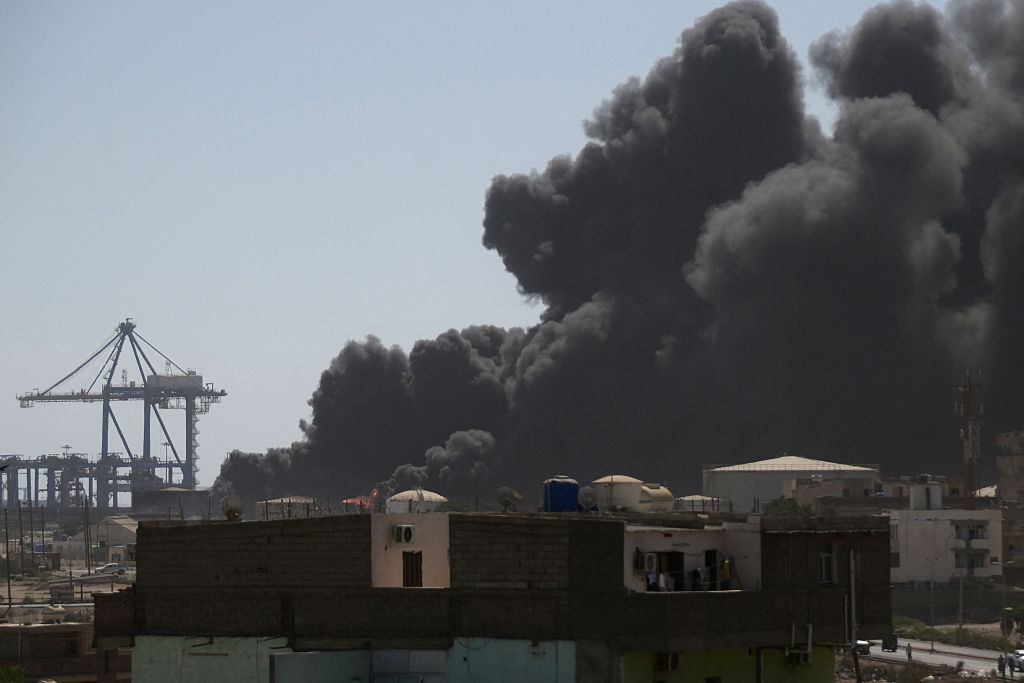A kamikaze drone attack on Sudan’s wartime capital, Port Sudan, in early May threatens to turn Sudan’s 3-year-old conflict into a broader regional war, according to a Sudanese official. The attack has implications for Turkey and the United Arab Emirates, which support opposing sides in the conflict.
“Until recently, this conflict could be described as a proxy war [between Turkey and the UAE]. However, it has taken a dangerous turn, verging on a regional war, with the UAE’s barely concealed direct intervention,” Babikir Elamin, Sudan’s ambassador to the United Kingdom, recently told the U.K. parliament.
The fighting that began in April 2023 between the Sudanese Armed Forces (SAF), led by Gen. Abdel Fattah al-Burhan, and the paramilitary Rapid Support Forces (RSF) led by Gen. Mohamed Hamdan “Hemedti” Dagalo, has been fueled in part by weapons and technical support from outside the country.
Since the start of the fighting, the United Nations and other outside analysts have reported that the UAE has supported the RSF. Early in the war, aid was smuggled through a hospital serving displaced persons in Chad, but more recently it has come through direct flights to the RSF-controlled parts of Darfur.
The UAE, which has a long history of laundering gold smuggled out of mines controlled by Hemedti’s family, denies supplying weapons to the RSF.
Turkey, for its part, has supplied the SAF with Bayraktar TB2 drones and Turkish operators. The drones have helped the SAF turn the tide against the RSF in recent months. SAF troops have retaken large parts of eastern and central Sudan, including the capital region.
The RSF has boosted its supply of drones with the help of the UAE, according to observers. In late April, the Humanitarian Research Laboratory at the Yale School of Public Health identified six advanced Chinese drones believed to have come from the UAE at the RSF-controlled airport in Nyala, South Darfur.
Turkish drones destroyed a military cargo plane on the ground at that airport a little more than a week later. The plane was suspected of bringing more Chinese-made drones from backers in the UAE. The attack killed dozens of RSF fighters along with several Emiratis.
A day later, on May 4, suicide drones began striking targets across Port Sudan, including a power station, oil depot and the international airport. The six days of attacks also destroyed military targets and damaged the port. Middle East Eye reported that several members of the Turkish technical support team at the port helping with drone operations were wounded.
Al-Burhan’s government moved to Port Sudan after the RSF overran Khartoum early in the war. Until the drone assault, the city had been a haven from the fighting that has engulfed the rest of the country.
The attacks on Port Sudan’s infrastructure were designed to inhibit the SAF’s ability to supply its forces in Khartoum and to launch attacks on RSF strongholds in Darfur, according to an analysis by the Institute for the Study of War.
Sudanese authorities accuse the UAE, not the RSF, of planning and executing the drone attack, possibly from bases in Darfur or northern Somalia. Jalel Harchaoui, an associate fellow at the Royal United Services Institute for Defence and Security Studies, agreed with that assessment.
“The UAE likely carried out every aspect of the Port Sudan attacks,” he told Middle East Eye. “So, I think the UAE is on a very personal rampage now.”
The Sudanese government broke off ties with the UAE after the Port Sudan attacks. Two weeks later, Sudan said the UAE expelled its consular staff from the country.
The tensions between Turkey and the UAE in Sudan echo the situation in Libya, where Turkey supplied weapons and manpower to aid the internationally recognized government in Tripoli, while the UAE backed the army of Field Marshal Khalifa Haftar that sought to conquer the entire country. Haftar, in turn, provided some material support to the RSF early in its war with the SAF.
According to Alan Boswell, an expert on Sudan for the International Crisis Group, any response by the SAF and its Turkish backers to the Port Sudan assault has the potential to draw Turkey and the UAE deeper into Sudan’s internal conflict, further devastating the country.
“We could see an escalating war with greater and greater firepower, and nothing would be left of Sudan’s infrastructure by the end of it,” Boswell told Al Jazeera.

